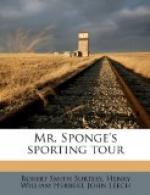Presently a glimpse of green country or of distant hills may be caught between the wider spaces of the houses, and frequent settings down increase the space between the passengers; gradually conservatories appear and conversation strikes up; then come the exclusiveness of villas, some detached and others running out at last into real pure green fields studded with trees and picturesque pot-houses, before one of which latter a sudden wheel round and a jerk announces the journey done. The last passenger (if there is one) is then unceremoniously turned loose upon the country.
Our readers will have the kindness to suppose our hero, Mr. Sponge, shot out of an omnibus at the sign of the Cat and Compasses, in the full rurality of grass country, sprinkled with fallows and turnip-fields. We should state that this unwonted journey was a desire to pay a visit to Mr. Benjamin Buckram, the horse-dealer’s farm at Scampley, distant some mile and a half from where he was set down, a space that he now purposed travelling on foot.
Mr. Benjamin Buckram was a small horse-dealer—small, at least, when he was buying, though great when he was selling. It would do a youngster good to see Ben filling the two capacities. He dealt in second hand, that is to say, past mark of mouth horses; but on the present occasion, Mr. Sponge sought his services in the capacity of a letter rather than a seller of horses. Mr. Sponge wanted to job a couple of plausible-looking horses, with the option of buying them, provided he (Mr. Sponge) could sell them for more than he would have to give Mr. Buckram, exclusive of the hire. Mr. Buckram’s job price, we should say, was as near twelve pounds a month, containing twenty-eight days, as he could screw, the hirer, of course, keeping the animals.
Scampley is one of those pretty little suburban farms, peculiar to the north and north-west side of London—farms varying from fifty to a hundred acres of well-manured, gravelly soil; each farm with its picturesque little buildings, consisting of small, honey-suckled, rose-entwined brick houses, with small, flat, pan-tiled roofs, and lattice-windows; and, hard by, a large hay-stack, three times the size of the house, or a desolate barn, half as big as all the rest of the buildings. From the smallness of the holdings, the farmhouses are dotted about as thickly, and at such varying distances from the roads, as to look like inferior ‘villas,’ falling out of rank; most of them have a half-smart, half-seedy sort of look.
The rustics who cultivate them, or rather look after them, are neither exactly town nor country. They have the clownish dress and boorish gait of the regular ‘chaws,’ with a good deal of the quick, suspicious, sour sauciness of the low London resident. If you can get an answer from them at all, it is generally delivered in such a way as to show that the answerer thinks you are what they call ‘chaffing them,’ asking them what you know.




